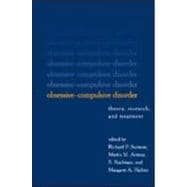
Note: Supplemental materials are not guaranteed with Rental or Used book purchases.
Purchase Benefits
Looking to rent a book? Rent Obsessive-Compulsive Disorder Theory, Research, and Treatment [ISBN: 9781572307322] for the semester, quarter, and short term or search our site for other textbooks by Swinson, Richard P.; Antony, Martin M.; Rachman, S.; Richter, Margaret A.. Renting a textbook can save you up to 90% from the cost of buying.
| Psychopathology and Theoretical Perspectives | |
| Diagnostic Issues and Epidemiology in Obsessive-Compulsive Disorder | p. 3 |
| Psychological Approaches to the Understanding of Obsessional Problems | p. 33 |
| Cognitive and Behavioral Features of Obsessive-Compulsive Disorder | p. 51 |
| Personality and Obsessive-Compulsive Disorder | p. 79 |
| Families of Individuals with Obsessive-Compulsive Disorder | p. 120 |
| Biological Models of Obsessive-Compulsive Disorder: The Serotonin Hypothesis | p. 141 |
| Neuroimaging and Neuroanatomical Issues in Obsessive-Compulsive Disorder: Toward an Integrative Model--Perceived Impulsivity | p. 154 |
| Genetics of Obsessive-Compulsive Disorder | p. 181 |
| The Relationship between Obsessive-Compulsive Disorder and Other Anxiety-Based Disorders | p. 207 |
| Assessment and Treatment | |
| Assessment of Obsessive-Compulsive Disorder | p. 229 |
| Psychosocial Treatments for Obsessive-Compulsive Disorder: Literature Review | p. 258 |
| Psychosocial Treatments for Obsessive-Compulsive Disorder: Clinical Applications | p. 277 |
| Biological Treatments for Obsessive-Compulsive Disorder: Literature Review | p. 298 |
| Biological Treatments for Obsessive-Compulsive Disorder: Clinical Applications | p. 327 |
| Combination Treatments for Obsessive-Compulsive Disorder | p. 349 |
| Obsessive-Compulsive Disorder in Children and Adolescents | p. 367 |
| Obsessive-Compulsive Spectrum Disorders | |
| Conceptual Foundations of Obsessive-Compulsive Spectrum Disorders | p. 397 |
| Recognition and Treatment of Obsessive-Compulsive Spectrum Disorders | p. 426 |
| List of Resources for Obsessive-Compulsive Disorder and Obsessive-Compulsive Spectrum Disorders | p. 459 |
| Index | p. 467 |
| Table of Contents provided by Syndetics. All Rights Reserved. |
The New copy of this book will include any supplemental materials advertised. Please check the title of the book to determine if it should include any access cards, study guides, lab manuals, CDs, etc.
The Used, Rental and eBook copies of this book are not guaranteed to include any supplemental materials. Typically, only the book itself is included. This is true even if the title states it includes any access cards, study guides, lab manuals, CDs, etc.